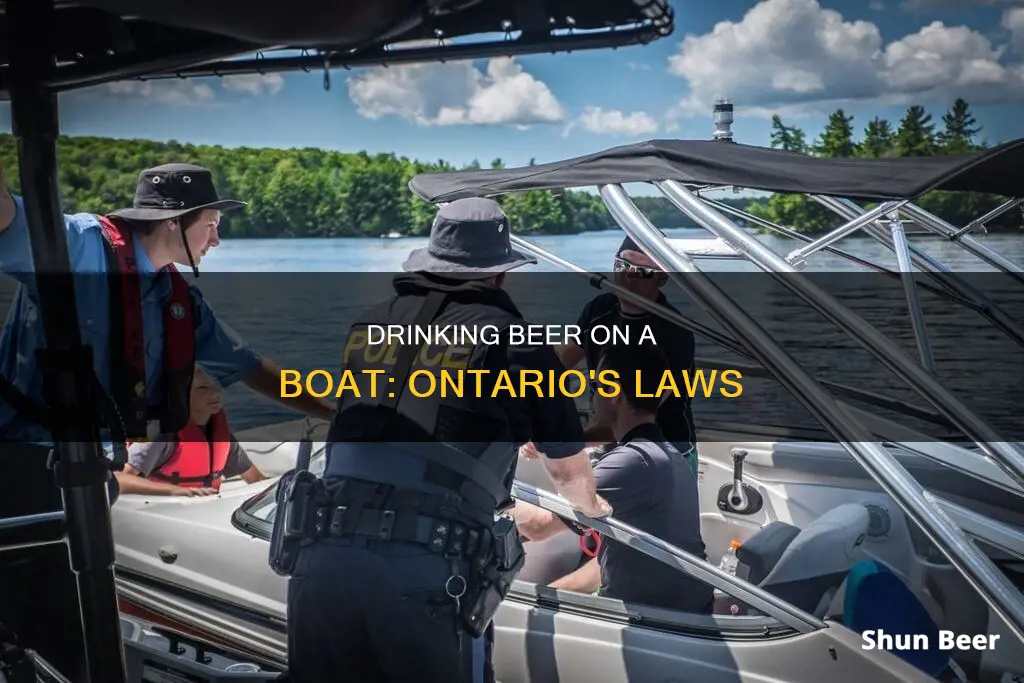
Drinking on a boat in Ontario is a topic that requires careful consideration of the relevant laws and regulations. It is essential to understand the rules and restrictions to ensure a safe and enjoyable experience for everyone on board. In Ontario, the consumption of alcohol on boats is subject to specific guidelines, and both operators and passengers must comply with these regulations to avoid legal consequences and ensure their safety.
What You'll Learn

Drinking and boating laws in Ontario
Drinking and boating is a dangerous combination. It is as dangerous as drinking and driving, and can lead to serious boating accidents and injuries for yourself or others on your boat or nearby. Even if you avoid an accident, Canadians can face significant penalties if they are caught drinking and boating.
In Ontario, it is illegal to operate a boat while impaired by alcohol or drugs, including cannabis. The same rules that apply to drinking and driving on land also apply to boating. The Criminal Code of Canada states that it is a criminal offence to operate a boat while intoxicated, with a maximum allowable blood alcohol concentration (BAC) of 80mg per 100ml (0.08%). This is measured using a breathalyser or blood test.
Under the Ontario Liquor Licence Act, open containers of alcohol are prohibited on board a boat unless specific conditions are met. Both the operator and passengers are prohibited from consuming alcohol while the boat is in motion. Passengers may only consume alcohol if the boat has permanent cooking and sleeping facilities, a standalone washroom (not a portable toilet), and is moored, beached, or anchored.
Penalties for Drinking and Boating in Ontario:
The penalties for operating a boat under the influence in Ontario are similar to those for driving a vehicle while impaired. Fines and penalties increase based on the number of offences and the operator's BAC level. For a first offence, there is a minimum fine of $1,000. For a second offence, there is a minimum fine of $1,000 and a minimum of 14 days in prison. For a third or subsequent offence, there is a minimum fine of $1,000 and a minimum of three months to five years in prison.
In addition to fines and imprisonment, those convicted of boating under the influence in Ontario may also have their boating and driving licences suspended and be required to participate in Ontario's Ignition Interlock Program.
Transporting Alcohol on a Boat in Ontario:
It is legal to transport alcohol on a boat in Ontario, as long as it is sealed or stored in a closed container. Unopened containers of alcohol must be stored in a secure area, such as a locked cabinet or cooler.
Cannabis Use on Boats in Ontario:
Since 2018, cannabis has been legal in Canada, but there are rules and regulations regarding its use on boats. Cannabis use on a boat is subject to the same restrictions as alcohol. It is illegal to consume cannabis in a moving boat, and the boat must be anchored, moored, or beached. Law enforcement officials may use drug recognition techniques and blood, urine, or oral fluid samples to establish impairment. Penalties for cannabis impairment while boating include fines of up to $1,000 and possible jail time, depending on THC concentration levels.
Police Searches and Alcohol on Boats in Ontario:
Police officers in Ontario have the authority to stop and search boats for alcohol. They can require identification and proof of ownership, and may ask to search the boat for alcohol or other illegal substances. If alcohol is found to be transported or consumed in violation of the law, individuals may be subject to fines and other penalties.
Tooth Extraction and Beer: What's Safe?
You may want to see also

Drinking and fishing laws in Ontario
Drinking and boating is a dangerous combination, and it is as unsafe as drinking and driving. In Canada, 65% of boating-related accidents involve alcohol consumption, and alcohol is linked with more than 40% of all boating deaths.
Drinking and Boating Laws in Ontario
In Ontario, it is illegal to operate a boat while impaired by alcohol or drugs, including cannabis. The same rules that apply to drinking and driving on land also apply to boating. If your Blood Alcohol Concentration (BAC) exceeds 80mg or 0.08%, you are considered over the legal federal limit for operating a boat. BAC levels are measured with a breathalyser or blood test.
It is also illegal to have open containers of alcohol on a boat in Ontario, except under certain conditions. Boat passengers may legally consume alcohol on board a boat if the boat:
- Has permanent cooking facilities
- Is equipped with permanent sleeping facilities
- Has a permanent toilet (a portable toilet does not count)
- Is anchored or secured to a dock (not in motion)
Most yachts and houseboats meet these requirements, but smaller boats are less likely to have these features. It is the responsibility of the boat operator to ensure that the boat meets these requirements before anyone consumes alcohol on board.
Drinking and fishing can be a dangerous combination. Alcohol impairs judgement and reaction time, making it more difficult to react to changing conditions on the water. Fishing requires concentration and focus, which can be compromised by alcohol consumption. If you plan on fishing on a boat, it is best to avoid alcohol altogether.
Penalties for Drinking and Boating in Ontario
The criminal code boating and drinking penalties are the same as those that apply to driving while under the influence or impaired driving on land. If you are caught drinking and boating in Ontario, you may have your boating licence suspended for a year, and you may also have to participate in Ontario's Ignition Interlock Program.
Beer Growlers: How Do They Work?
You may want to see also

Drinking on a boat vs. in a car in Ontario
Drinking on a boat or in a car in Ontario is subject to similar rules and penalties. In both cases, operating the vehicle while under the influence of alcohol is illegal. The Criminal Code of Canada sets a Blood Alcohol Concentration (BAC) limit of 80mg or 0.08%—the same as the legal limit for operating an automobile.
In Ontario, the Ministry of Transportation assesses fines and penalties for drinking and driving a boat as they would for drinking and driving a car. The penalties for operating a boat under the influence in Ontario include a minimum fine of $1,000 for the first offence, at least 30 days of imprisonment for the second offence, and a minimum of 120 days of imprisonment for the third offence.
In both cases, the operator of the vehicle must remain sober. Passengers on boats in Ontario are allowed to consume alcohol, but only in small amounts, as they must stay below the legal BAC limit of 0.08%. The same applies to passengers in cars.
There are some differences between drinking on a boat and in a car in Ontario. For drinking on a boat to be legal, the boat must be moored to the dock, anchored, or beached (not in motion). Additionally, the boat must have a permanent toilet, cooking facilities, and sleeping facilities. These requirements do not apply to drinking in a car.
Another difference is that in Ontario, if you are convicted of boating under the influence, you can have both your boating license and your driving license suspended. This means that drinking on a boat can lead to the loss of your driving privileges on land.
In summary, drinking on a boat and in a car in Ontario is subject to similar rules and penalties, with both activities requiring the operator to remain sober and passengers to stay below the legal BAC limit. However, drinking on a boat has additional requirements regarding the boat's facilities and whether it is in motion, and it can result in the suspension of your driving license.
Apple Cider Vinegar and Beer: A Healthy Mix?
You may want to see also

Drinking on a boat in Ontario: the penalties
Drinking on a boat in Ontario comes with serious penalties and risks. Here is an overview of the rules and the associated fines and punishments.
Drinking on a Boat in Ontario: The Rules
Firstly, it is illegal to have open containers of alcohol on private boats in Ontario unless the boat has permanent cooking facilities, a permanent sleeping area, a permanent toilet (not a portable one), and is moored to the dock, anchored, or beached.
The Penalties
If you are caught drinking on a boat in Ontario, the penalties are the same as those for drinking and driving a car. If convicted of boating under the influence, you can expect the following punishments:
- First offence: a minimum fine of $600 to $1,000, and a one-year suspension of both your boating and driving licences.
- Second offence: a minimum fine of $600 and at least 14 days in prison, or 30 days in some sources.
- Third offence: a minimum fine of $600 and at least 90 days in prison, or 120 days in some sources.
In addition, Ontario's Ignition Interlock Program will be installed in your vehicle, and you may be required to participate in an education or treatment program and undergo a medical evaluation.
Other Risks
Drinking and boating is extremely dangerous. Alcohol negatively affects your judgment, reflexes, and balance, and impairs your ability to react to unexpected situations. It is a factor in over 40% of boating deaths in Canada, and 65% of boating-related accidents.
Beer and Cancer: What's Safe to Drink?
You may want to see also

Drinking on a boat in Ontario: the effects
Drinking on a boat in Ontario has serious effects on the body and can lead to dangerous situations. Here are some of the key effects of drinking on a boat, outlined by Ontario's regulations and safety guidelines:
Impaired Judgement and Coordination
Alcohol consumption impairs judgement and coordination, making it more difficult to react to unexpected situations on the water. It reduces a person's ability to process information, slows down reaction times, and diminishes motor skills. This can lead to accidents and increase the risk of falling overboard.
Dehydration and Heat Stroke
The combination of heat and alcohol consumption can lead to dehydration, which in turn increases the rate of alcohol absorption into the body. Dehydration also causes stomach cramps, affecting a person's ability to swim and stay above water if they fall overboard. Additionally, alcohol reduces the body's resistance to cold, accelerating the onset of hypothermia.
Increased Risk of Drowning
Alcohol consumption slows down the swallowing and breathing reflexes, making it harder to stay afloat and increasing the risk of drowning if someone falls overboard.
Negative Effects on Health
Drinking on a boat can have detrimental effects on an individual's health, including "Yachtsman's Fatigue," caused by the combination of sun exposure, wind, noise, and the movement of the water and vessel. This can have a negative impact on the body, and alcohol consumption quadruples the effects of these factors.
Legal Consequences
Drinking and boating in Ontario can result in serious legal consequences. Operating a boat while intoxicated is a criminal offence, and individuals caught drinking and boating may face fines, imprisonment, and suspension of their boating and driving licenses. The penalties increase for repeat offences, with mandatory minimum fines and custodial sentences.
Increased Risk of Accidents and Death
Drinking on a boat significantly increases the risk of accidents and death. According to statistics, 65% of tragic accidents on the water are caused by alcohol consumption. This is a serious issue that Ontario's boating rules aim to address and reduce.
The Science of Beer: Foam Detectors Explained
You may want to see also
Frequently asked questions
Drinking beer on a boat in Ontario is legal for passengers, but only in small amounts. Passengers must adhere to the legal blood alcohol concentration (BAC) limit of 80 mg per 100 ml (0.08%).
No, it is illegal to operate a boat while intoxicated in Ontario. The operator must remain sober at all times to ensure the safety of everyone on board.
The penalties for operating a boat under the influence in Ontario include a minimum fine of $1,000 for the first offence, a minimum of 30 days of imprisonment for the second offence, and a minimum of 120 days of imprisonment for the third offence.
Yes, it is legal to transport alcohol on a boat in Ontario, provided it is either sealed or stored in a closed container.
Drinking beer while fishing on a boat is not recommended as it can impair your judgment and reaction time. Alcohol is linked to more than 40% of all boating deaths in Ontario.







